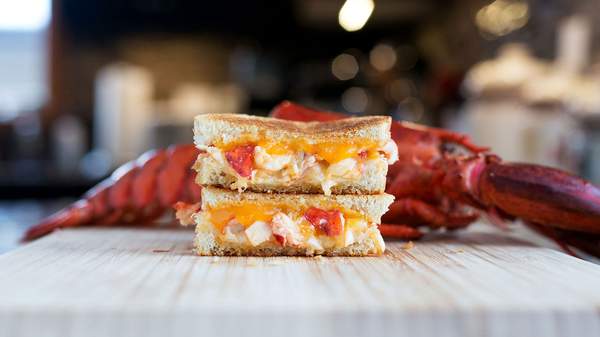In partnership with
Overview
Last year, you ate copious amounts of burgers, and to balance it out, bunches and bunches of kale. Your beer got craftier than ever before. You wanted to know more about where your food came from, so you chatted to farmers and ate locally-sourced produce. Instead of extensive menus overloaded with choice, you opted for simpler, cleaner and more expertly-prepared dishes. You kept food trucks doing the rounds. You learnt more about Korean cuisine. And you decided that food tastes better when you share it.
So, what's in store for 2015? We're expecting sustainability and seasonality taken to extremes, with hearty broths and micro-seasonal menus; the decline of kale; the rise of roots; veggie-fuelled desserts; cheaper lobster; more restaurant swaps; and epic, multi-sensory dining experiences, thanks to the wonders of neurogastronomy. Here are eight trends to look out for.
VEGETABLES IN DESSERTS
If only your mama had thought of this when she was struggling to get those Brussels sprouts down your recalcitrant, pint-sized throat. Pretending that vegetables aren't vegetables at all, but actually dessert, is one surefire way to crank up your five-a-day tally. In countries like Vietnam, where beans, lotus root and the like frequently feature in sweet treats, this isn't a new thing. But we're only just getting on the healthy yet tasty dessert bandwagon.
RESTAURANT AND BAR SWAPS
It seems that chefs and restaurateurs the world over are growing increasingly restless. Rather than keeping their gastronomical discoveries to their local clientele, they're keen to share them across regions and even hemispheres via swaps. Thousands of Melbournians got lucky (or greedy) when Heston Blumenthal announced he'd be bringing his Fat Duck to town, while Denmark's Noma has just opened its doors in Tokyo for a two-month stint. The trend is picking up at bar level too, with the Rook and Black Pearl doing an exchange in May last year.
BROTH
The more finite the Earth's resources are starting to look, the less we want to waste. In ancient times, when frugality was a necessity rather than an eco-conscious choice, the humble broth was master. Concocted out of animal bones and veggie scraps, it turned mere leftovers into a comfort food feast. Today, broth is the logical extension of our continual move towards sustainable food production. What's more, only Thai restaurants can compete when it comes to names. A restaurant in Melbourne has already jumped on the inevitable: Brothl, while in New York, there’s Brodo. Bring on the broth in 2015.
AFFORDABLE LOBSTER
After years of exclusivity, the lobster is at last stepping off its high horse and coming down to the street. Heading up the new egalitarian approach in Sydney is Burger Liquor Lobster, which has popped up for summer in both Paddo and Manly, waving $15 lobster rolls and lobster popcorn in front of our seafood-craving faces. The crustacean is getting affordable in London, too, where new trendy hangout Burger and Lobster is selling 2000 lobsters per day across six shopfronts.
HATTED CHEFS OPENING CASUAL DINERS
This trend, which comes direct from Paris, represents the latest in the growth of premium dining in a casual atmosphere. Hatted chefs are expanding beyond their illustrious premises into bistros, where they're making high-end gastronomy accessible to a mid-range crowd. In late 2013, the team behind the Bentley and the Monopole opened an eatery in Potts Point’s once-bohemian Yellow House. Then, last year, chef Mark Best of Marque brought his cooking to (more of) the people with the opening of Pei Modern in both Sydney and Melbourne.
MICROSEASONAL MENUS
'Seasonal produce' and 'paddock-to-plate philosophy’ are the well-established catch-cries of many an Australian eatery. It looks like they’ll be taken even further in 2015 with a trend towards microseasonal menus. These promise fresher and more interesting cuisine than ever before, with dishes changing not with each shift of the earth's axis, but with every passing day. The alterations are ever-so-slight and subtle, and entirely dependent on available ingredients.
UGLY ROOT VEGGIES
Kale's been more ubiquitous than cuts to the arts over the past year or so. But we’re not sure how much longer it's going to fare, given the rise and rise of ugly root vegetables. We're not talking about the good old potato, but its numerous more exotic-sounding and tasting (if not especially good-looking) cousins. As mentioned, parsnips have been sneaking their way into dessert menus, but then there's the likes of celery root and kohlrabi.
NEUROGASTRONOMY
Did you know that on average, a pink strawberry dessert tastes ten percent less sweet on a black plate than it does on a white one? Or that, if you drink a single malt whisky while surrounded by real grass and birdsong, it tastes more herbaceous? Try it, on the other hand, around red lighting and curved furniture and it'll seem sweeter. Starting to get what 'neurogastronomy' means? We now have scientific proof that all of our senses — rather than our tastebuds alone — influence how we perceive flavour. A professor at Oxford University by the name of Charles Spence is obsessed with studying this phenomenon. Spence and a bunch of fellow experts have been developing an intense multisensory dining experience, which combines textures, colours, aromas and temperatures, having previously worked with the likes of Ferran Adrià and Heston Blumenthal.
Image credits: Speed Bump Kitchen, jane boles via photopin cc
